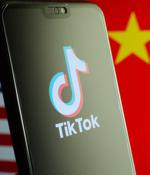Security News

TikTok, the social video platform used by around 150 million people in the US, is set to hand access to its source code, algorithm and content-moderation material to Oracle in a bid to allay data protection and national security concerns stateside. Oracle's association with TikTok stems from efforts under the Trump administration to force owner ByteDance to sell the US stake to an American company.

Fresh off the back of an embarrassing "Grilling" by US Congress on national security grounds, TikTok has received a more concrete reprimand from the UK's Information Commissioner's Office - a fine of £12.7 million for "Misusing children's data." Despite TikTok's own rules disallowing children under the age of 13, the video-sharing app's whirlwind success has meant that some 1.4 million kids in the UK used it in 2020 by the ICO's estimates.

Australia has joined the growing list of nations that have decided TikTok represents an unacceptable risk when running on government-owned devices, so has decided not to allow it onto those machines. Citing "Advice from intelligence and security agencies," attorney-general Mark Dreyfus today announced the national government will "Prohibit the TikTok app on devices issued by Commonwealth departments and agencies. The direction will come into effect as soon as practicable."

The world's oldest national broadcaster, the venerable British Broadcasting Corporation, has told staff they shouldn't keep the TikTok app on a BBC corporate device unless there is a "Justified business reason." The national broadcaster told staffers in the in-house mag that while they could do what they liked with their personal phones "Based on your individual circumstances and data considerations," if the device is a BBC corporate device "And you do not need TikTok for business reasons," they must delete TikTok promptly.

Asia In Brief ByteDance, the Chinese developer of TikTok, "Can no longer be accurately described as a private enterprise" and is instead intertwined with China's government, according to a report [PDF] submitted to Australia's Select Committee on Foreign Interference through Social Media. The report alleges that China's government noticed as Douyin - the Chinese version of TikTok - boomed.

The United Kingdom government has banned use of Chinese social media platform TikTok among ministers and officials on their work devices as a "Precautionary" measure over worries the app is used to snoop on Brits. Speaking to Parliament this afternoon, Oliver Dowden, chancellor of the Duchy of Lancaster and Secretary of State who oversees Cabinet Office policy, said the ban would have immediate effect and applied to devices issued within ministerial and non-ministerial departments, but not to "Personal devices for government employees or ministers or the general public."

The White House has ordered all federal government employees to delete TikTok from work devices, over fears the video-sharing app could be used to spy on Americans. TikTok has been downloaded by billions of people around the world, and is particularly popular among young people - but the US government believes that data could be shared with the Chinese government.

Congress is currently debating bills that would ban TikTok in the United States. There are several ways Congress might ban TikTok, each with different efficacies and side effects.

The European Commission on Thursday banned the use of the TikTok short video app on corporate devices and on the personal devices of employees enrolled in the commission's mobile device management service. The commission's statement cites the need to protect staff from a rising number of cyber threats but fails to explain while TikTok was singled out.

Korean car-makers Hyundai and Kia will issue software updates to some of their models after a method of stealing them circulated on TikTok, leading to many thefts and even some deaths. The "Kia Challenge" started circulating in mid-2022 and explained that it's possible to remove the steering column covering on some Hyundai and Kia models by force, exposing a slot that fits a USB-A plug.